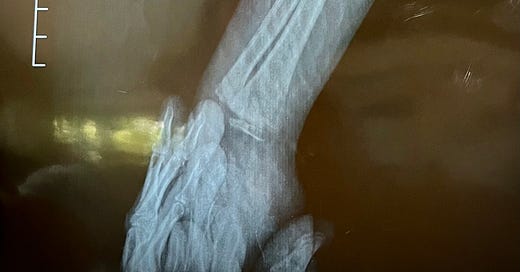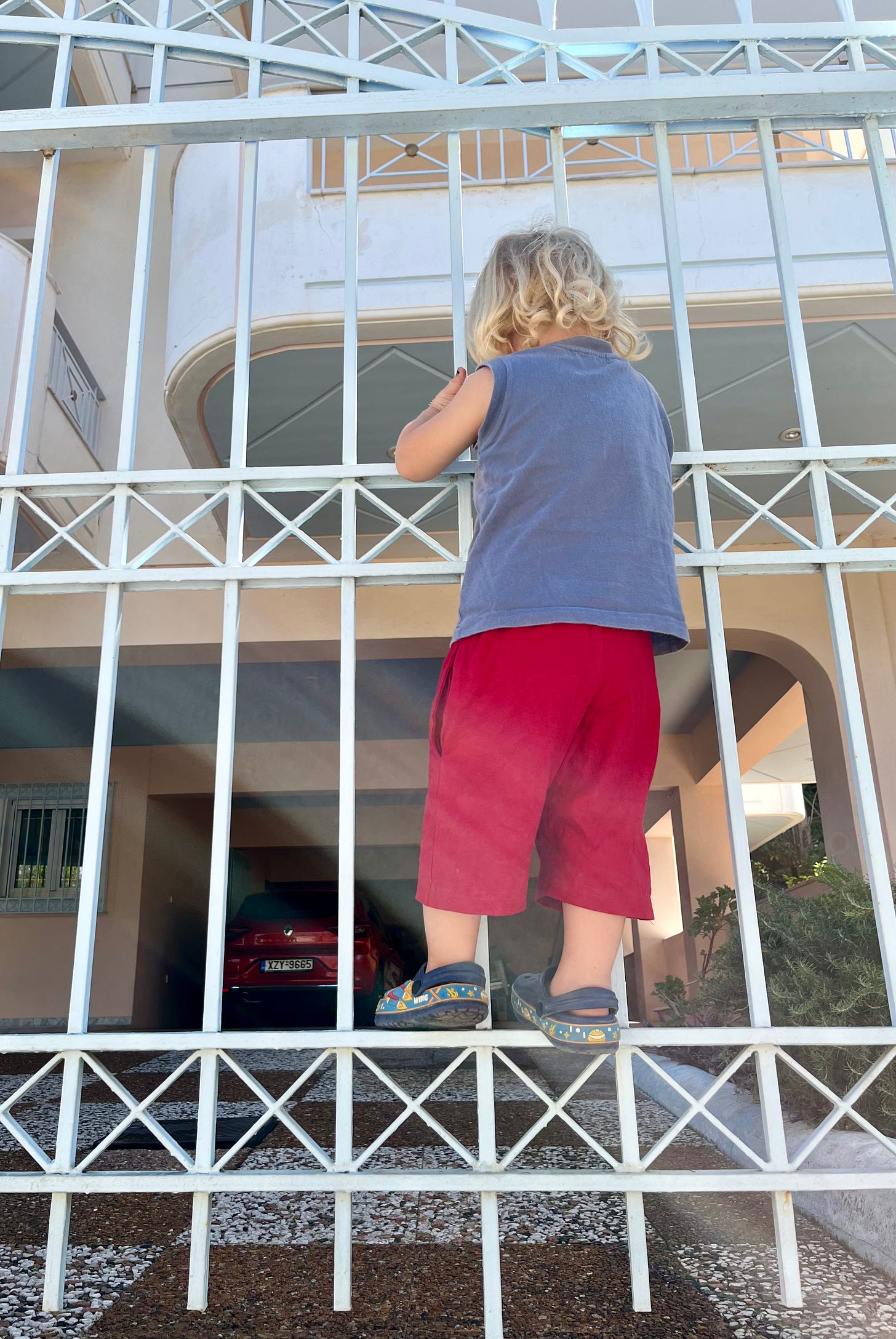Transitions
A son with a fractured arm. The other is adapting to the nursery. My projects, postponed. We don't care because we love, we love because we care.
We got back to Greece two weeks ago. The jetlag this time was not as dramatic as a year and a half ago, when we came back from Buenos Aires and spent a week with messed up schedules and just as many days between colds and flus. Regardless, this landing into our daily life in Greece was turbulent but in an unexpected way, mainly due to a miscalculation.
Since León was born, almost two years ago, somehow in my mental calendar I had set September 2024 as the month when my life — beyond caregiving and housework — would resume.
I underestimated transitions. Rather, I did not think about them right. Lorenzo started his last year of kindergarten this month and León his first. Well, as September is coming to a close, León is still going through his adaptation period, which means he's only staying there for a few hours a day. Just enough time to do some groceries or answer messages and emails. Or, like now, to edit this newsletter.
My miscalculation — as if life were so linear — once sidelined my work and personal projects for a while longer, as it happened frequently over the past five years as a result of a choice that works for Irene and me as a couple, and also for me as an individual. And a little bitterness emerged again. But this time, the big difference is that with León I am having more fun than with Lorenzo at that age. Could it be that I have learned something?
This is about me, not about the kids, I thought to myself, while I was reading an avalanche of posts on social networks from parents grateful about the post-summer return to school. I get it, it happens to me too. But I also feel a bit miserable when I have this burning desire to leave the kids at kindergarten. Why so much urgency?
Look: it is not about the fact that they go to kindergarten, it is about that desperate feeling to get rid of the children. Why did we have them then? Why are we in such a hurry? We know that the structure of a system in crisis and the nuclear family do not help.
Actually, the whole system feed back into the hurry and stress we feel for the kids to grow up so that they don’t get anything dirty, they don’t scream, they don’t bother us, so that they become independent — at the same time it also makes us desperate to spend our time getting things done.
At the time, I questioned myself a lot about my discomfort with Lorenzo. I suffered enough being full time in his care for the first two years — which included a nomadic lifestyle with no support network and in the middle of the pandemic.
The identity impact was critical then: I stopped being a journalist who traveled and covered exciting events — soccer World Cups, Chávez's death in Venezuela, Olympic Games, celebrity interviews, etc. I became a male who had stopped earning money, while learning to change diapers and follow a baby and his whims. It changed my social world. Well, exactly what has been happening forever to women who become mothers.
That crisis led me to Recalculating (that's how it all started) and to a set of new questions. Who am I as a man if I don't do what I was raised to do — work for money to support my family? What am I going to talk about at barbecues if my stories are about caring for a baby — a rather alien and boring world even for those who have been fathers for a long time?
Enough here. Very long digression. The thing is that with León I am more attentive to something that all parents with adult children say: this phase will not last long. I know it from my own experience too: with Lorenzo, the baby phase has long passed, and he is already on his way to being a kid, with adolescence just around the corner. It is not an exaggeration: when León turns Lorenzo's age now, Lorenzo will already be entering the world of adolescence.
And all this is happening fast: when my next newsletter goes out, in two weeks, León will surely be fully inserted in kindergarten and I will have time to plan the future of Recalculating, will be considering the possibility of launching a podcast, meeting for potential projects... In short, I will finally have time to put into practice what I learned in the CUNY program for journalists that I did last semester.
That's coming up soon. Now it's time to take it slowly when León comes out of the nursery so that he can greet all the dogs on the block and climb over the fences. We have to walk from the nursery gate to the car. And it is better if we can do it without rushing.
Anxiety grows when I forget that, somehow, life is a permanent transition. In every sense. From children to partners, to family and friends, to our interests, decisions and actions.
In all of this, there is one thing that does not change: the soil needs plowing to get it ready for what is to come. The “now” is key to the “after”. The after may be unpredictable — it always is, isn't it — but what we do before we get there will still be key to that future experience.
A fracture
After three days of oiling the engines of the routine of the new school year, all was thrown up in the air once again — not only because León's adaptation demands a progressive process that, I understand, I had not contemplated before because of my own anxiety.
Life happens. One day after the scab fell off León's fractured thumb (after a month of dealing with bandages and more), when it seemed that the ship was righting itself, only 24 hours later, Irene phoned me: in the warm-up of the second soccer practice of the new season, Lorenzo fractured his ulna and radius.
They rushed to the children's hospital in Athens, with Lorenzo crying non-stop because of the two broken bones in his right forearm, the hand he uses more easily. Lorenzo managed to escape surgery — not the rough and painful maneuver necessary to straighten the arm — and will have to spend a month to a month and a half in a cast (just below the shoulder and up to the hand, with the arm at 90 degrees).
The care that he now needs is a challenge for someone as energetic as Lorenzo: he can't fall — at the risk of having to have surgery or break his other arm or so many other possibilities — so he can't run, jump or do anything “agitado”, or rough, as he likes to say in Spanish.
“I can't do any of my favorite things,” Lorenzo complained, ”nor can I play with one hand.” To which I commented, “Actually, you can't play with two hands, but you can play with one hand.” He kept thinking.
Is this a time to work on patience, to confront frustration, to create new ways to have fun? To stick to complaining and lamenting, or to keep moving and learning. That's the question, isn't it? For him, for me, for all four of us.
Care is also a challenge for me, although this time I surprised myself with more patience than usual. “You like to take care of him, you told him in the shower, and it was obvious from how you were washing him, nicely, slowly, with the sponge,” Irene told me, about a moment over the weekend that she observed but I hadn't retained.
“We don't care for children because we love them; we love them because we care for them,” wrote Alison Gopnik, renowned professor of psychology and philosophy at the University of California, Berkeley, in her book The Gardener and The Carpenter. In other words, love results from caring, not vice versa. I know it's utopian, but what would happen if we all took care of each other?
Gopnik’s idea is a beautiful concept that I end up understanding properly only when I experience them (hallo parenthood!!). Listening to such concepts or reading them helps me complete the full circle of learning and understanding. For example, it helps me think that love for a child, in a way, is learning to put someone else's needs before your own.
In these days of mixed feelings, questions also arose: why did his pain cause me so much pain, even knowing that we will never totally avoid the suffering of a child? Why would I want to avoid the suffering of my children if I went through (and continue to go through) a thousand difficult situations from which I learned?
And these others: when will I resume my projects that I had scheduled for September? Is my ignorance of transitions an unconscious way of procrastinating? Will a paid and flexible enough job reappear, one that fits my current availability and possibilities?
For the time being, I wrote this newsletter on Sunday morning. I don't like to work on the weekend, which is when the four of us can be together — something we are still learning to do, because we all have different rhythms and needs. But those are the days that Irene usually doesn't work, and those are also the times when we can both take some time off to do something other than work or be with the kids.
So I'm going to stop here. I'm glad I wrote what I could. Now I'm going back to León, Lorenzo and Irene. Luckily for me (and I know it is a privilege too), today work and everything else can wait. At least it can wait a little bit more — without so much anxiety but without getting too distracted either.
Thank you very much to those who keep sharing this newsletter, subscribing and writing to me (you can always do it by hitting reply to this mail, I answer everything!).
I really like it when you send me suggestions or criticize, complete or fix something I wrote in my text. I also love it when you tell me about your experiences. From the bottom of my heart, thank you for so much.
You can find the archive of all the past editions of Recalculating here.
If you want to give me a hand, it helps me a lot if you “like” the post (it's the little heart that appears at the top and the bottom of the text) or if you share it with someone else (a thousand thanks to all of you who have been doing it! 😉).
You can also post on social media and tag me on Twitter (@pereyranacho), or Instagram (@nachopereyra23) or Facebook (Nacho Pereyra).
See you in two weeks!
With love,
Nacho
🙏 Many thanks to Worldcrunch for translating and editing this newsletter.
Before on Recalculating:
Thinking About My Late Parents On A Nostalgic Morning
On a morning of unprecedented nostalgia, before preparing breakfast, I searched on Spotify: “FM Horizonte”. And yes, there is more than one playlist with the music from the Argentine radio station that my dad used to tune into in the morning. Why did I search for it?






